Troy, Troas, Assos, and Lesbos...
Friday was an incredibly busy day, sorry I didn't have time to post stuff yesterday, but I'll try and catch you up here. We started the day in Cenakkale, which is the port city just to the east (on the Asian side) of the Dardenelles. From there we drove in the AM to Troia, which many consider to be the ancient city of Troy, made famous by Homer's Iliad. There is a great debate in scholarship as to whether the Trojan War as presented by Homer actually occured. Homer wrote around 800BCE (though it is doubtful he was a single individual), describing events presumed to have happened around 1200 BCE, a war between Ilium (Troy) and the Spartans (in Greece). In the 19th century some amateur archaeologists thought they had discovered the ancient city, and scholarship has debated ever since whether there is enough of a city here to have been the great city described in the Iliad. They have excavated 9 different cities here (same city, different time periods) and it is an incredibly complicated problem. My own opinion is that there were probably a series of minor skirmishes that got embellished into a legendary story by Homer. Regardless, the site of Troy has some fascinating ruins (the oldest going back to about 3000 BCE, the most recent settlement about 300CE). We spent about 1.5 hours there, and I've included pictures below.
From Troy we went to Alexandria Troas, which is a port city down the coast, site of Paul’s mission activity in Acts 16. Not a whole lot to see there, but a neat harbor where Paul and his buddies set sail.
From Alexandria Troas we drove to Assos, which is a fantastic ancient city built on top of a hill, overlooking the Aegean and the island of Lesbos. Everything you think of in the Greek isles you have here, including the clear blue water, the cliffs, and the beautiful clear skies. We had lunch there, and climbed to the ancient Acropolis, which includes fantastic city walls and the Temple of Athena, a 6th century BCE Doric temple, which stands at the edge of the cliffs overlooking the Aegean. The island of Lesbos is where Aristotle did much of his work.
After a long day of ruins, we headed for Bergama, which is the modern name of the ancient Hellenistic, and then Roman, city of Pergamum, which we tour on Saturday. This was a fantastic day of ruins, supplemented by reports from some really knowledgeable people on our trip. Check out the pictures below, though they really do not do it justice.
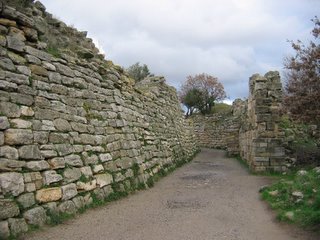 Here are the walls of Troy VI, which many believe is the layer of the city that could be from Homer. The style of wall here is classically Greek, as you see the smaller, random shaped stones put together. Roman walls incorporated bigger, uniform stones. This wall is the front of the city, which actually backed up to the sea. To answer Mike's question, the sea now is about 500 yards from Troy, but in ancient times the sea would have backed up rigth to the city (whether that is THE troy or not, is debatable)
Here are the walls of Troy VI, which many believe is the layer of the city that could be from Homer. The style of wall here is classically Greek, as you see the smaller, random shaped stones put together. Roman walls incorporated bigger, uniform stones. This wall is the front of the city, which actually backed up to the sea. To answer Mike's question, the sea now is about 500 yards from Troy, but in ancient times the sea would have backed up rigth to the city (whether that is THE troy or not, is debatable)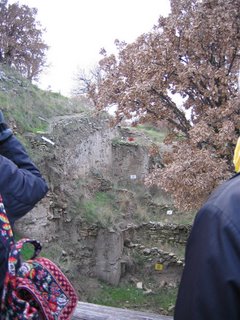 Here is a good look at the excavation of Troy and the various layers of the city. Archaeologists have identified at least 9 distinct settlements on the site, identified by the different numbers. Troy VI (and perhaps VII) are believed to be around 1300-1200 BCE, the time of the Trojan War.
Here is a good look at the excavation of Troy and the various layers of the city. Archaeologists have identified at least 9 distinct settlements on the site, identified by the different numbers. Troy VI (and perhaps VII) are believed to be around 1300-1200 BCE, the time of the Trojan War.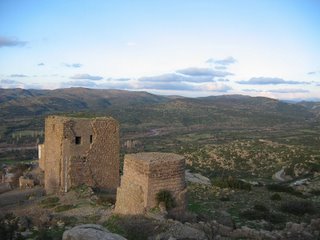 Now we're in Assos. As we ascend the big hill you can see the towers of the walls of the city.
Now we're in Assos. As we ascend the big hill you can see the towers of the walls of the city.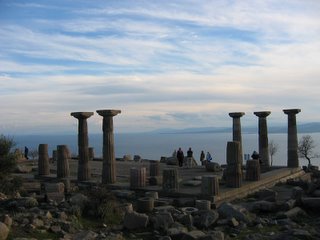 Now you can see what the walls were defending. This the Temple of Athena on the acropolis. You can get a sense of the scale of this place by looking at some of my colleagues. This site is overlooking the Aegean, the islands in the background are part of Greece.
Now you can see what the walls were defending. This the Temple of Athena on the acropolis. You can get a sense of the scale of this place by looking at some of my colleagues. This site is overlooking the Aegean, the islands in the background are part of Greece.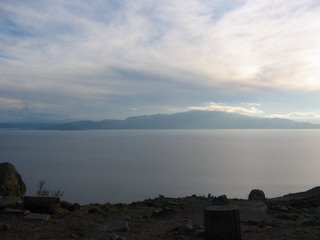 Here you see the view of the island of Lesbos (modern day Greece) from the Temple of Athena. All name jokes aside, Lesbos is a really important place of Aristotle's works. It is not hard to imagine why he was interested in studying nature after seeing this view everyday!
Here you see the view of the island of Lesbos (modern day Greece) from the Temple of Athena. All name jokes aside, Lesbos is a really important place of Aristotle's works. It is not hard to imagine why he was interested in studying nature after seeing this view everyday!

1 Comments:
Interesting discussion about Homer and Troy. I have always struggled with what I think about people making this dramatic movies about history -- JFK, Munic, etc. -- that aren't necessarily completely accurate. I guess this sorta makes me think it's not that big of a deal b/c what's mainly important about history is that we learn its lessons and don't repeat them. As long as the lessons are recorded -- by Homer, Stone or Spielberg -- then I guess some tinkering or "embelishing" is okay.
Typical Bo, he visits the Island of Lesbos, and all we get is a picture of a sunset!
Post a Comment
<< Home